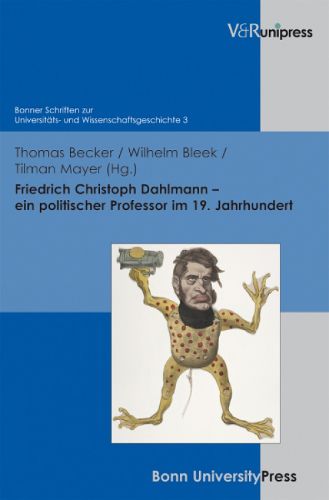Readings Newsletter
Become a Readings Member to make your shopping experience even easier.
Sign in or sign up for free!
You’re not far away from qualifying for FREE standard shipping within Australia
You’ve qualified for FREE standard shipping within Australia
The cart is loading…






The historian, political teacher and constitutional politician Friedrich Christoph Dahlmann (1785-1860) was the most prominent among the political professors before and during the revolution of 1848. Even as a professor in Kiel, Dahlmann advocated the indivisibility of the two duchies of Schleswig and Holstein made unpopular with the Danish rule. In Goettingen, he led the protest of seven professors against the coup d'etat by the Hanoverian king. As Bonn professor, Dahlmann was elected to the Frankfurt National Assembly and was one of the fathers of the Paulskirche constitution, in the tradition of which the Bonn Basic Law stands. This volume pays tribute to the interrelationship between Dahlmann’s academic learning, moral convictions and political commitment. His contributions are not only relevant to the history of the university and science, they also deal with the topicality of Dahlmann’s teachings.
$9.00 standard shipping within Australia
FREE standard shipping within Australia for orders over $100.00
Express & International shipping calculated at checkout
Stock availability can be subject to change without notice. We recommend calling the shop or contacting our online team to check availability of low stock items. Please see our Shopping Online page for more details.
The historian, political teacher and constitutional politician Friedrich Christoph Dahlmann (1785-1860) was the most prominent among the political professors before and during the revolution of 1848. Even as a professor in Kiel, Dahlmann advocated the indivisibility of the two duchies of Schleswig and Holstein made unpopular with the Danish rule. In Goettingen, he led the protest of seven professors against the coup d'etat by the Hanoverian king. As Bonn professor, Dahlmann was elected to the Frankfurt National Assembly and was one of the fathers of the Paulskirche constitution, in the tradition of which the Bonn Basic Law stands. This volume pays tribute to the interrelationship between Dahlmann’s academic learning, moral convictions and political commitment. His contributions are not only relevant to the history of the university and science, they also deal with the topicality of Dahlmann’s teachings.